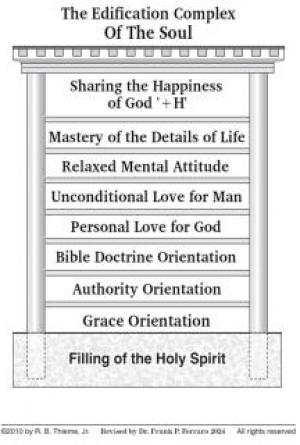FOOTNOTES (1-5)
[1] Jesus.
[2] The intellect admits a liar's displaying
mu'jizas and says, "Since Allâhu ta'âlâ is Almighty, He can do
this, too." This conclusion, which is not compatible with divine
law, or even the rare occurrence of events suitable with this
conclusion, does not harm our knowledge of events that are
compatible with the divine law of Allâhu ta'âlâ. For example,
killing or revivifying by the ad-Dajjâl, the liar who will come
towards Doomsday, does not change our knowledge about his being a
liar. The fact that Nimrod's fire did not burn Ibrâhîm ('alaih
's-salâm) does not change Allâhu ta'âlâ's law that gives a burning
capacity to fire. However, the occurrence of events contradicting
information acquired by the intellect through proofs gives harm to
this information.
[3] “...: and none can know the forces of
thy Rabb [Allâhu ta’âlâ], Except He.
...”(74-31)
[4] It is essential in îmân to accept the
commandments, that is, to believe that is necessary to do the
commands and to abstain from the prohibitions. One who believes
most of the commandments but disbelieves only one of them and does
not want to obey it will have disbelieved Muhammad ('alaihi
's-salâm). He will become an unbeliever. Being a Muslim requires,
believing in all the commandments. If a Muslim, though he believes
the commandments, disobeys them, e.g. does not perform salât out of
laziness, or, following his bad friend or nafs, has alcoholic
drinks, or, in case of a woman or girl, goes out with her arms
and/or head uncovered, he or she does not lose their îmân or become
an unbeliever. A person of this sort is a sinful, disobedient
Muslim. If he does not want to obey even one of the commandments,
that is, if he disapproves it, does not esteem it as a duty or
slights it, he loses his îmân and becomes a murtadd
(renegade). Such statements as, "What if I do not perform salât and
go out with a bare head? Living and doing favours to people have
precedence over salât,” mean to approve some of the commandments
and disapprove others. Every Muslim must pay attention to this
subtle point, and those who disobey the commandments must be
vigilant lest they should lose their îmân. Neglecting the
commandments is different from wishing not to obey them. These two
should not be confused!
[5] Tawâtur is the state of being
widespread or being reported by most people, which is a document
for authenticity and makes denial impossible.
FOOTNOTES (6-15)
[6] Examples of these are given in the book
Endless Bliss, refer to ‘idiosyncrasy’ and
‘allergy’.
[7] Furthermore, some medicinal preparations
which have been found useful by scientists and doctors by means of
experimentation and bought eagerly for considerable sums of money
by everybody are frequently found out to be harmful afterwards.
Lists of such preparations, each concluded with a sentence banning
their sale, are regularly dispatched by health authorities to
drugtores. Factories manufacturing such drugs are closed down by
governments. It has become a usual topic for daily newspapers that
some much-sought-after medicines have proven to be harmful
afterwards. It has appeared again in daily newspapers repeatedly in
recent years that hundreds of popular medicines that are called
antibiotics cause heart disease and cancer and that some detergents
are deleterious to health.
[8] Saj' means the continuous cooing of
the dove. In prose, it means the ryming that occurs at the end of
sentences.
[9] Abû Bakr Baqillânî died in 400
A.H.
[10] Heraclius died in 20 A.H.
[11] Ibrâhîm Nishaburî passed away in 400
After Hijra.
[12] The two sûras beginning with
"Qul-a'ûdhu."
[13] Moses.
[14] They themselves did not like this, so
they could not read it in the presence of Muhammad ('alaihi
's-salâm).
[15] As it is seen in the previous passage, a
mu'jiza is created by Allâhu ta'âlâ. Everything is created by
Allâhu ta'âlâ. There is no creator other than Allâhu ta'âlâ. Only,
in order for there to be order in the world and in worldly affairs,
He has made the creation of everything dependent upon some causes.
A person who wishes something to be created applies the cause
related to that thing. Most causes are things that can be found by
thinking, experience or calculation. When the cause of something is
applied, Allâhu ta'âlâ creates it if He wills to. The case is not
so with a mu'jiza or karâma, Allâhu ta'âlâ creates these in an
extraordinary way, without causes. Holding fast to the causes means
to follow His law of causation. When He creates something without
causes, He suspends His law and creates it exraordinarily. A
mu'jiza happens only through Prophets. It does not happen through
other people. Saying, "He performed a miracle," or "He was saved
miraculously", which are said to praise someone, is the same as
saying that the person in question is aProphet. In this matter, not
the intention but the expression should be considered. It causes
disbelief to ascribe prophethood to someone. He who does so loses
his îmân. So is the case with calling anyone other than Allâhu
ta'âlâ "Creator" or saying that somebody has created such and such
a thing. Muslims must avoid uttering such dangerous
words.
FOOTNOTES (16-20)
[16] The word ‘harf’, as
it is written in the book Riyâd an-nâsîhîn, means dialect,
reading. The copy of the Qur'ân al-kerîm compiled by Hadrat Abû
Bakr contained all of the seven different kinds of readings. When
Hadrat ’Uthman became the Khalîfa, he convened the Sahâbat al-kirâm
and it was unanimously decided that the new copies of the Qur'ân
would be written as Rasûlullah ('alaihi 'ssalâm) had recited it in
the last year of his life. It is wâjib to read the Qur'ân as such.
It is also permissible to read it in the other six ways.
[17] Here, al-Imâm ar-Rabbânî (quddisa
sirruh), referring to the book Sharh-i mawâqif, wrote in
detail that, according to a branch of knowledge called balâghat
(rhetorics), the âyat “Hâdhâni lasâhirâni” is in a degree of
i'jâz. We have not translated that part.
[18] People who study the English literature
and linguistics must be familiar with types of verbal parallelism
such as anaphora, cataphora, epistrophe, symploce, anadiplosis,
epanalepsis, antistrophe polyptoton, and so forth.
[19] For those who wish to know about the
beautiful life of Muhammad ('alaihi 's-salâm), we recommend the
Turkish books Qisâs-i Anbiyâ and Mawâhib-i
ladunniyya.Also, there is detailed information in the first
part of the Turkish original, and in the first fascicle of the
English version (Chapter 56) of Endless Bliss, under the
heading Hilya-i Sa'âdat.
[20] Hadrat Muhammad and the Qur'ân,
Part 2, Chapter 2; London.
FOOTNOTES (21-40)
[21] Weekly periodical,
The Muslim World, Pakistan, August 26, 1972.
[22] Jean Mocheim, German theologian and
historian, died in 1169 (1755)
[23] ‘The Decline and Fall of the Roman
Empire’, Edward Gibbon, edited by Dero A. Saunders, pp.
650-660.
[24] Jacques-Yves Cousteau [1911-1997] French
underwater explorer.
[25] Sayyid: a descendant of the
Prophet.
[26] Âlim: Muslim scholar.
[27] Ahl as-Sunnat: the true followers
of (the Companions of) the Prophet. Jerîde-i 'Ilmiyye Mecmû'ası,
no. 48, p. 1484.
[28] Tamerlane, or Tamburlaine.
[29] Please see the twelfth
chapter.
[30] faid: ma'rifa.
[31] harâm: act, thing, forbidden in
Islam.
[32] ma'rifa: knowledge about Allah,
inspired to the hearts of Awliyâ': pl. ma'ârif.
[33] karâmât: miracles Allah works
through Awliyâ'.
[34] Adhân: the call to
prayer.
[35] Rasûlullah: Hadrat Muhammad, the
"Prophet of Allah.'
[36] Salât: namâz, ritual
prayer.
[37] Sahâbî: a companion of the
Prophet.
[38] Âbânî: white cotton material
embroidered all over with small squares of yellow
thread.
[39] Al-murshid al-kâmil: the perfect
guide.
[40] Qutb: the highest Walî in one or
several countries, with whom other Walîs consult about their
problems
FOOTNOTES (41-60)
[41] Hajj:
pilgrimage to Mecca.
[42] Halâl: permitted,
unquestioning.
[43] Îmân: faith, belief.
[44] Sunnat: those things done and
liked by the Prophet.
[45] İmâm: A Muslim leading the
congregational salât.
[46] Takbîr: the phrase "Allâhu akbar"
(Allah is the Greatest).
[47] Ârif: a great Walî whose heart has
gained knowledge about Allâhu ta'âlâ's Person and Attributes. One
higher among the 'ârifs is called "kâmil." An 'ârif kâmil who can
pour this knowledge into his disciple's heart is called a
"mukammil."
[48] Sûfiyya al-'aliyya: the superiors
of Tasawwuf: Awliyâ'
[49] Silsilat al-'aliyya: a chain of
Walîs each of whom was a mukammil and who acted as an intermediary
for the ma'rifa, nûr and faid to come from the blessed heart of
Rasûlullah to that of a Walî. (Every Walî, murshid, has a
silsila.)
[50] Wilâyat: the status of, state of
being a walî.
[51] Khatm-i khâja: certain things
recited silently by a murshid and his disciples, after which the
names of the Awliyâ' in the silsila of the murshid are mentioned,
and the blessings of what are recited are offered to their souls,
whose faid and ma'rifat are then asked for.
[52] Rafîq al-a'lâ: the highest status
in Paradise, which was the request of theProphet as his last
wish.
[53] Shaikh-i subha: a Walî's second
murshid (guide, shaikh) whom he knows to be higher than himself and
at whose suhba (company, lecture) he attends after his own
murshid's death (At this suhba both Walîs benefit from each
other.)
[54] 1 lira is 100 kurushes.
[55] Sarf: Arabic ethymology or
morphology.
[56] Nahw: Arabic syntax.
[57] Hüseyin Hilmi Işık's this first
translation is quoted at the end of the fourth chapter of
Endless Bliss, II.
[58] Awâmil: a famous textbook of
nahw.
[59] Salâm: Islamic greeting expressing
peace and good wishes.
[60] Sunnat: an act done and liked by
the Prophet, yet a duty of lesser degree than a wâjib.
FOOTNOTES (61-68)
[61] Wâjib: an act
never omitted by the Prophet, almost as compulsory as a
fard.
[62] Marriage contract as prescribed by Islam.
There is detailed information about nikâh in the twelfth chapter of
the fifth fascicle of Endless Bliss.
[63] Talqîn: words telling and making
the soul and heart of a dead person hear through the effect of the
knowledge of îmân.
[64] With its twelve hundred pages, the book,
in Turkish, is a masterpiece and an ocean of religious and worldly
knowledge. Part of it has been translated into English in
fascicles, 1, 2, 3, 4 and 5. Its Arabic translation is
underway.
[65] Tekke: a school where a murshid
trains his disciples.
[66] Sharî'at: the laws of
Islam.
[67] Al-'ilm al-ladunnî: knowledge
inspired by Allah to the hearts of Awliyâ'.
[68] Knowledge that is acquired not for the
purpose of practising it with ikhlâs, will not be beneficial.
Please see the 366 th and 367 th pages of the first volume of Hadîqa, and
also the 36th and the 40 th and the 59 th letters in
the first volume of Maktûbât. (The English versions of these
letters exist in the 16 th and the 25
th and the 28 th
chapters, respectively, of the second fascicle of Endless
Bliss).







